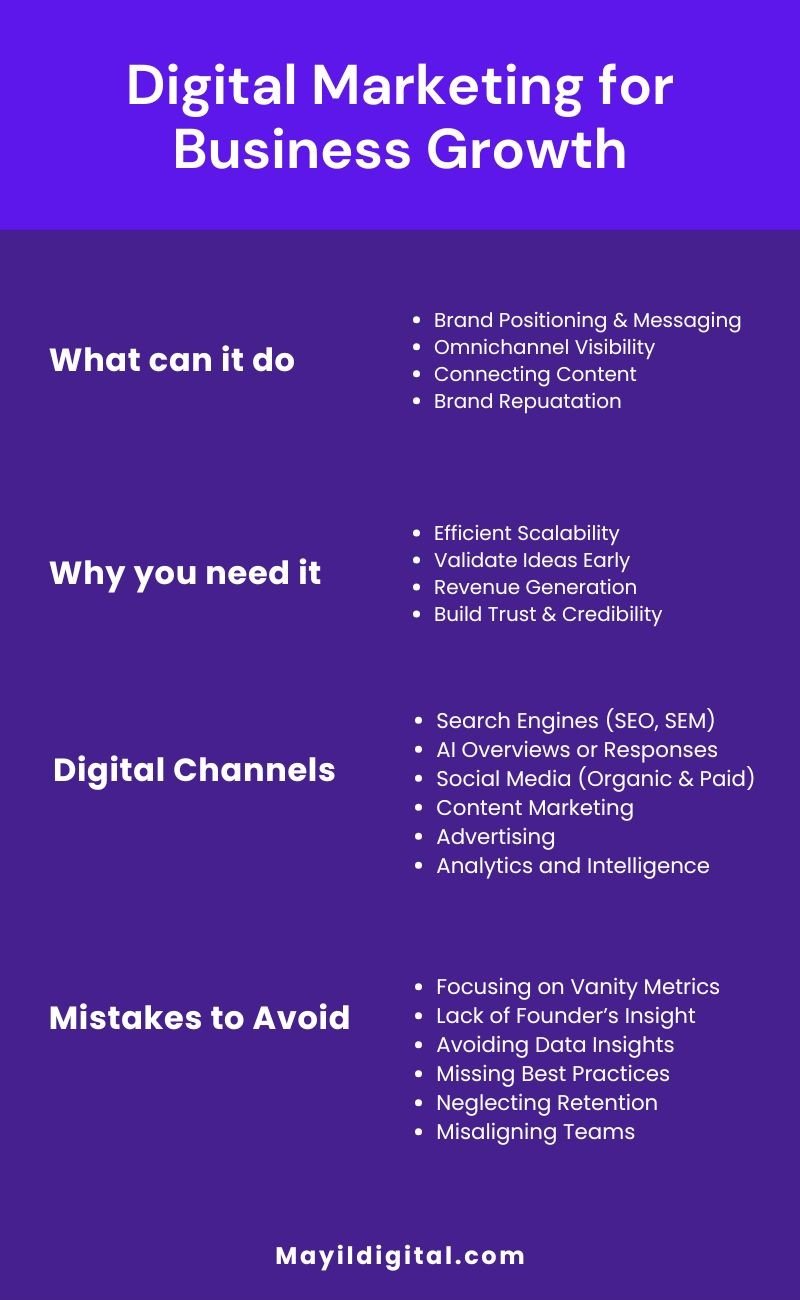Digital marketing refers to the use of digital channels—such as search engines, social media, email, paid advertising, and content platforms—to reach target audiences, influence behavior, and drive business outcomes. Unlike traditional marketing, digital marketing enables real-time engagement, precise targeting, and measurable results.
Today’s founders are empowered by digital marketing, not as a support function but as a growth engine. It accelerates go-to-market strategies, validates ideas quickly, and builds customer trust before significant capital is invested, giving them a sense of control and confidence in their business decisions.
What is Digital Marketing?
Digital marketing promotes products, services, or brands through online platforms and technologies. Core channels include:
- Search engines (SEO and SEM)
- AI overviews or responses
- Social media (organic and paid)
- Email marketing
- Content marketing
- Display and programmatic advertising
- Analytics and conversion tracking
Digital marketing offers speed, scale, and precision with data. Campaigns can be launched in hours, refined in real-time, and tracked down to the conversion. Compared to traditional advertising, digital campaigns offer lower costs, more targeted advertising, and clearer attribution.
Why Founders Should Prioritize Digital Marketing
Digital marketing allows founders to build traction without relying on large sales teams or external funding. It supports early-stage product validation, rapid iteration, and cost-efficient user acquisition, all of which contribute to building strong and secure customer relationships.
Key advantages include:
- Rapid feedback loops: Launch campaigns and gather market reactions within weeks
- Budget efficiency: Target only relevant segments with conversion tracking
- Scalability: Start with lean experiments and scale what works
- Credibility: Create content and campaigns that build trust and position the brand as a solution leader
Early-stage companies that embed digital marketing into product and brand development achieve faster product-market fit and stronger customer retention.
How Founders Can Use Digital Marketing Effectively
Validate Product-Market Fit Early
Digital marketing enables low-risk testing of business ideas before building a complete product. Utilize landing pages, lead magnets, and paid advertisements to gauge demand and refine your positioning. This process, known as ‘product-market fit,’ satisfies a strong demand for a product in the market. It’s a crucial concept in digital marketing, as it helps you understand whether your product is meeting the market’s needs.
Tools: Google Ads, Unbounce, Typeform, Carrd
Approach: Run A/B tests, collect engagement metrics, and track conversions
According to CB Insights, 35% of startups fail due to insufficient market demand. Testing digitally reduces this risk significantly.
Build Authority and Trust
Strong content builds authority and drives engagement. Founders should establish a presence across multiple platforms with content that educates, inspires, and addresses real-world problems.
Channels: LinkedIn, YouTube, blogs, newsletters
Formats: Case studies, whitepapers, how-to guides, founder updates
High-value content builds search visibility (SEO), strengthens social presence, and positions the brand as a trusted advisor.
Generate Demand with Paid Campaigns
Once messaging and audience fit are validated, use paid campaigns to scale reach and conversions. Focus on high-intent keywords, which are specific phrases that indicate a strong interest in your product or service, as well as retargeting and lookalike audiences.
Platforms: Google Search, Meta Ads, LinkedIn Ads
Metrics to track: ROAS, CAC, CTR, conversion rate
Performance marketing delivers predictable pipeline growth when targeting and creatives are aligned with user intent.
Turn Customers into Advocates
Happy customers serve as powerful marketers. Activate them through referral programs, testimonials, and post-sale content.
Tools: Mailchimp, ConvertKit, ReferralCandy, Trustpilot
Tactics: Automated thank-you flows, social sharing incentives, review requests
An intense post-sale journey increases customer lifetime value and organic reach.
Track, Measure, and Optimize
Analytics must guide every digital decision. Utilize behavioral data to pinpoint drop-offs, enhance the user experience, and increase conversion rates.
Tools: Google Analytics 4, Hotjar, Mixpanel, Meta Pixel
Focus areas: Funnel tracking, session recordings, event-based reporting
Consistent optimization compounds growth and prevents wasteful spending.
Common Mistakes to Avoid
- Focusing on vanity metrics: Followers and likes without conversions offer little value
- Lack of Insights: Founder’s knowledge is vital for the team to achieve the business targets
- Missing Best Practices: Low performance of channels and campaigns with an increase in cost
- Communication Gap: Teams misalign on the brand objectives when they chase their own goals
- Neglecting retention marketing: Nurturing and product education drive sustainable growth
- Skipping tracking setup: Launching without analytics leads to uninformed decisions.
Avoiding these pitfalls ensures more substantial returns from every digital marketing initiative.
Position Marketing as a Growth Engine
Digital marketing functions as a strategic growth layer, not just a promotional tool. Founders who adopt it early gain insights faster, acquire users more efficiently, and position their brand for long-term success, making them feel strategic and forward-thinking.
Build a foundation with experimentation, data, and customer empathy. When used correctly, digital marketing doesn’t just support business growth—it drives it.

